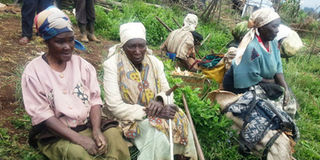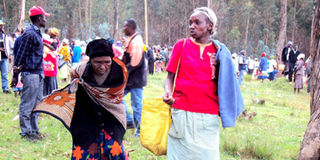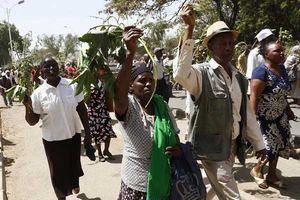
Lands Cabinet Secretary Alice Wahome.
The government may have lost nearly Sh100 million in a controversial land purchase meant to resettle victims of the 2007 post-election violence.
The revelations emerged in a case where the Nakuru Land and Environment Court reinstated the title deed to the original landowners after some family members contested the sale of their ancestral land to the government for resettling Internally Displaced Persons (IDPs).
The deal involved the acquisition of 755 acres from the owners of Ndonga Farm (LR No6507/IR No2195) in Subukia, Nakuru County, to resettle 266 IDPs.

Elderly and displaced women at Kwa Muhu farm after returning from local farms where they do casual jobs.
“The court hereby directs that the government surrenders the original title deed of the 755-acre land to the family. IDPs are also hereby barred from subdividing the land known as Ndonga Farm illegally sold for the resettlement,” said Justice Heston Nyaga in his judgment.
The court ordered Lands Cabinet Secretary Alice Wahome to personally surrender the title deed to the court for handing over to the family, spelling doom for the IDPs who had been allocated plots on the farm. The court also barred them from settling on the land.
Forged documents
Documents filed in court indicate that materials used in the transaction between the then Ministry of Special Programmes and the purported sellers were forged.
In the case, eight sisters, a sister-in-law and a niece accused their kin—a brother to the sisters—of illegally selling part of their ancestral land to the government.
Ms Irene Kanyi, Mary Nyambura, Wangechi Mburu, Winnie Muthoni, Hellen Mureithi, Zipporah Waringa, Harriet Wanjiru, Loise Wanjiku, Mary Wangari and Penina Wangui claimed that their brother, Philip Kamau Njoroge, used forged documents to execute the sale.
The family sued the Attorney General, the Principal Secretary in the Ministry of Lands and the former Ministry of Special Programmes. The IDPs joined the case as interested parties.
According to the family’s lawyer, Mr Steve Biko, forensic investigations confirmed that the documents used in the land deal were falsified and that the signatures did not belong to the sisters, their sister-in-law, or their niece, who were registered owners of the land.
“A letter from the Directorate of Criminal Investigations (DCI) confirmed that ten signatures used in the transaction were forged. A forensic analysis had been ordered by a Nakuru court,” Mr Biko said.
“The High Court had ordered the DCI to investigate the authenticity of the Special Powers of Attorney document allegedly issued to Philip Kamau. The document was submitted for forensic examination at DCI headquarters, and the examiner concluded it was a forgery,” he added.
Mr Kamau, who had been appointed administrator of the estate of the late Benjamin Njoroge following a grant confirmed on December 2, 1997, colluded with the government to sell off the land without the consent or approval of the sisters and other rightful heirs.

People claiming to be integrated internally displaced persons from across the country camp outside the Nakuru Law Courts on April 06, 2017.
The sale was executed on July 29, 2011.
However, on October 19, 2011, Justice William Ouko issued an order restraining Mr Kamau, the government and other beneficiaries from taking possession of, subdividing, or interfering with the sisters’ use and occupation of the land.
“Our elder brother and administrator of the estate, in total breach of trust, violated all the conditions under the grant and sold the said parcel of land at a grossly undervalued price when he had no authority to do so,” Ms Wangechi stated in her supporting affidavit.
Violating inheritance rights
In another affidavit, Ms Irene Kanyi Mwangi said her brother colluded with the government to sell the land without the consent and approval of the vast majority of beneficiaries, thus violating their inheritance rights.
“Our brother surrendered our title deeds under a grant dated December 2, 1997, hence our inability to distribute or utilise our other properties—especially those not jointly owned under the grant or those whose titles had not been processed,” stated Ms Mwangi.
In his own affidavit, Mr Kamau admitted to being approached in 2010 by a government agent Elizabeth Ndumia who expressed the State’s interest in the land. He claimed he consulted his relatives and they agreed to sell at Sh500,000 per acre.

IDPs leave a meeting at Kuresoi, Nakuru County, on September 16, 2013 where they complained of being sidelined in the Sh400,000 resettlement funds.
In 2011, Ms Ndumia informed him that funds had been released to Rachier and Amollo Advocates and that he should make arrangements to collect the money.
“I was told the government had released Sh130,000 per acre making a total of about Sh98,150,000,” he stated in court documents.
For years, IDPs have been invading the expansive land, which most family members maintain was sold illegally. Led by Ms Mwangi, the family contested the sale of the property—part of their late father Benjamin Wamanji Njoroge's estate—and asked the court to revoke the settlement of IDPs on the land.
They argued that their brother sold the land without consulting them.
Transfer the land
According to a will filed in court, Kamau and another brother Phares Njoroge (deceased), were each to get 200 acres while the sisters were to share 220 acres, and another beneficiary, Owen Ndung'u, was also to receive 220 acres.
However, Mr Kamau, as administrator of the estate, went ahead and entered into an agreement with the government to sell and transfer the land on July 29, 2011.
A recent report by the Auditor General revealed that a Land Settlement Fund established over a decade ago to address Kenya’s landlessness crisis has spent Sh1.6 billion with no tangible resettlement of IDPs. The report, covering the financial year ending June 30, 2024, noted that despite huge spending to purchase land in various parts of the country, thousands of Kenyans remain landless.
The fund, which was meant to settle victims of the 2007/2008 post-election violence, has left many in limbo. In October 2012, the fund bought 1,112 acres in Kisima, Njoro, Nakuru County, for Sh396.9 million—but twelve years later, no beneficiaries have been allocated land. The land has neither been surveyed nor subdivided.
In April 2020, the government used Sh377 million to buy 91 acres at Mikanjuni Farm in Kilifi to resettle informal settlers. Years later, the land remains unoccupied, despite a verified list of beneficiaries.






